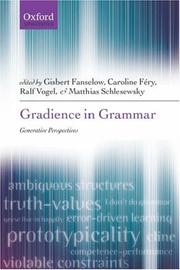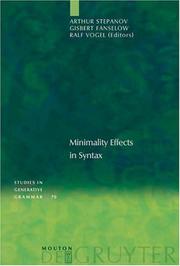| Listing 1 - 6 of 6 |
Sort by
|
Book
ISBN: 9783534249534 3534249534 Year: 2013 Publisher: Darmstadt : WBG (Wissenschaftliche Buchgesellschaft),
Abstract | Keywords | Export | Availability | Bookmark
 Loading...
Loading...Choose an application
- Reference Manager
- EndNote
- RefWorks (Direct export to RefWorks)
Ein solides Grundlagenwissen über die Morphologie des Deutschen ist für Studienanfänger im Fach Germanistik unerlässlich. Diese Einführung vermittelt gut verständlich und didaktisch angemessen aufbereitet die wichtigsten Kenntnisse für Seminar und Prüfung. Flexion und Wortbildung werden gleichermaßen berücksichtigt. Im Zentrum stehen die gängigen Methoden und Probleme der morphologischen Analyse sowie die geläufigen Begriffe, Konzepte und Theorien. Neben systematisch-synchronen Fragen werden auch der reale Gebrauch im Gegenwartsdeutschen und die damit zusammenhängende Variation sowie sprachhistorisch-diachrone Aspekte behandelt. Die variationslinguistische und sprachhistorische Betrachtung erfolgt exemplarisch und dient dazu, synchrone Zustände im Gegenwartsdeutschen anschaulicher zu machen.
Deutsch. --- Morphologie. --- German language --- Communication and technology --- Morphology --- Language --- Word formation --- German language - Morphology --- Communication and technology - Language --- German language - Word formation
Book
ISBN: 3662447622 Year: 2014 Publisher: Berlin, Heidelberg : Springer Berlin Heidelberg : Imprint: Springer,
Abstract | Keywords | Export | Availability | Bookmark
 Loading...
Loading...Choose an application
- Reference Manager
- EndNote
- RefWorks (Direct export to RefWorks)
Der Schicksalsbegriff ist, obwohl im wissenschaftlichen Diskurs aus der Mode gekommen, für die praktisch-psychotherapeutische Tätigkeit von hoher Relevanz und wird von Therapeutinnen und PatientInnen, explizit oder implizit, für kausale und prospektive Zwecke genutzt. Die vorliegende Schrift möchte, ausgehend von den philosophischen Grundannahmen hierzu, zu einer Auseinandersetzung mit den vielen Facetten des Schicksalsbegriffs anregen und einen Beitrag zur eigenen Stellung ‚dem Schicksal gegenüber‘ betragen. Schließlich werden therapierelevante Folgerungen abgeleitet. Der Inhalt • Psychopathologie und Schicksal • Akademische Schicksalsforschung • Das Schicksal im existenziellen Kontext • Das Schicksal in Therapie und therapeutischer Beziehung Die Zielgruppen • Dozierende und Studierende der Psychologie und Medizin, Auszubildende in der Psychotherapie • PraktikerInnen in Psychotherapie und Psychosomatik Der Autor Prof. Dr. Ralf T. Vogel ist Psychoanalytiker und Verhaltenstherapeut. Er ist Honorarprofessor für Psychotherapie und Psychoanalyse an der HfBk Dresden, stellv. Vorsitzender der Internationalen Gesellschaft für Tiefenpsychologie (igt) und führt eine private Praxis für Psychotherapie und Supervision in Ingolstadt.
Psychotherapy . --- Clinical psychology. --- Psychoanalysis. --- Psychotherapy. --- Counseling. --- Supervision. --- Clinical Psychology. --- Psychotherapy and Counseling. --- Consulting, Supervision and Coaching.

ISBN: 0199274797 9780199274796 0191705861 0191515280 1280843977 1429459409 Year: 2006 Publisher: Oxford Oxford University Press
Abstract | Keywords | Export | Availability | Bookmark
 Loading...
Loading...Choose an application
- Reference Manager
- EndNote
- RefWorks (Direct export to RefWorks)

ISBN: 1282193899 9786612193897 3110197367 9783110197365 9783110179613 311017961X 311017961X Year: 2004 Publisher: Berlin Mouton de Gruyter
Abstract | Keywords | Export | Availability | Bookmark
 Loading...
Loading...Choose an application
- Reference Manager
- EndNote
- RefWorks (Direct export to RefWorks)
The volume is a collection of 12 papers which focus on empirical and theoretical issues associated with syntactic phenomena falling under the rubric of Relativized Minimality (Rizzi 1990) or, in more recent terms, Minimal Link Condition (MLC, Chomsky 1995). The bulk of the papers are based on the ideas presented at the Workshop "Minimal Link Effects in Minimalist and Optimality Theoretic Syntax" which took place at the University of Potsdam on March 21-22, 2002. All contributors are prominent specialists in the topic of syntactic Minimality. The empirical phenomena brought to bear on Minimality/MLC in the present volume include, but not limited to: Superiority effects in multiple wh-questions, including those with 'D-linked' wh-phrase(s) (Müller, Haida, Haider) Stylistic Fronting in Germanic and Romance (Fisher, Poole) Transitive sentences in Hindi-type ergative languages (Stepanov) Word order 'freezing' effects in double-nominative constructions in Korean (Lee) Double object constructions in Greek (Anagnostoupoulou) Remnant constituent displacement in German and Japanese (Hale and Legendre) Nine of the proposed accounts are couched in the Minimalist framework (Chomsky 1995, 2000, 2001), three in the framework of Optimality Theory (Prince and Smolensky 1993). Thematically, the contributions divide into three groups addressing the following major questions: How can apparent violations of syntactic Minimality/MLC be accounted for? (Haida, Stepanov, Poole, Fisher, Anagnostopoulou) What is the status of MLC? Is it a primitive or a theorem in the grammar? (Müller, Fanselow, Lechner, Vogel, Lee, Haider) Can Minimality phenomena shed decisive evidence in favor of a derivational (Minimalist type) or a representational (Optimality theory like) framework? (Hale and Legendre, Haider)
Grammar, Comparative and general --- Minimalist theory (Linguistics) --- Generative grammar --- Language and languages --- Syntax --- Syntax. --- Grammar --- Linguistics --- Philology --- Grammar, Comparative and general Syntax
Book

ISBN: 9783110829068 Year: 2013 Publisher: Berlin Boston
Abstract | Keywords | Export | Availability | Bookmark
 Loading...
Loading...Choose an application
- Reference Manager
- EndNote
- RefWorks (Direct export to RefWorks)
Book

ISBN: 9783110377927 3110377926 9783110378092 9783110394245 3110394243 3110378094 9783110378108 3110378108 Year: 2015 Publisher: Berlin Boston
Abstract | Keywords | Export | Availability | Bookmark
 Loading...
Loading...Choose an application
- Reference Manager
- EndNote
- RefWorks (Direct export to RefWorks)
The book contains a collection of papers dealing with the question of how rhythm shapes language. Until now, there was no comprehensive theory that addressed these findings adequately. By bringing together researchers from many different fields, this book will make a first attempt to fill this gap.
Language and languages --- Germanic languages --- Psycholinguistics --- Langage et langues --- Langues germaniques --- Grammaires --- Psycholinguistique --- Rhythm --- Grammars --- Congresses. --- Rythme --- Congrès --- Congrès --- Conversation analysis. --- Language and languages -- Rhythm. --- Speech. --- Languages & Literatures --- Philology & Linguistics --- Cognitive grammar. --- Rhythm. --- Grammar. --- Grammar, Comparative. --- Cognitive linguistics --- Grammar, Comparative and general --- Teutonic languages --- Indo-European languages --- Prosodic analysis (Linguistics) --- Grammatical Processing. --- Linguistic Rhythm. --- Neurolinguistics.
| Listing 1 - 6 of 6 |
Sort by
|

 Search
Search Feedback
Feedback About UniCat
About UniCat  Help
Help News
News